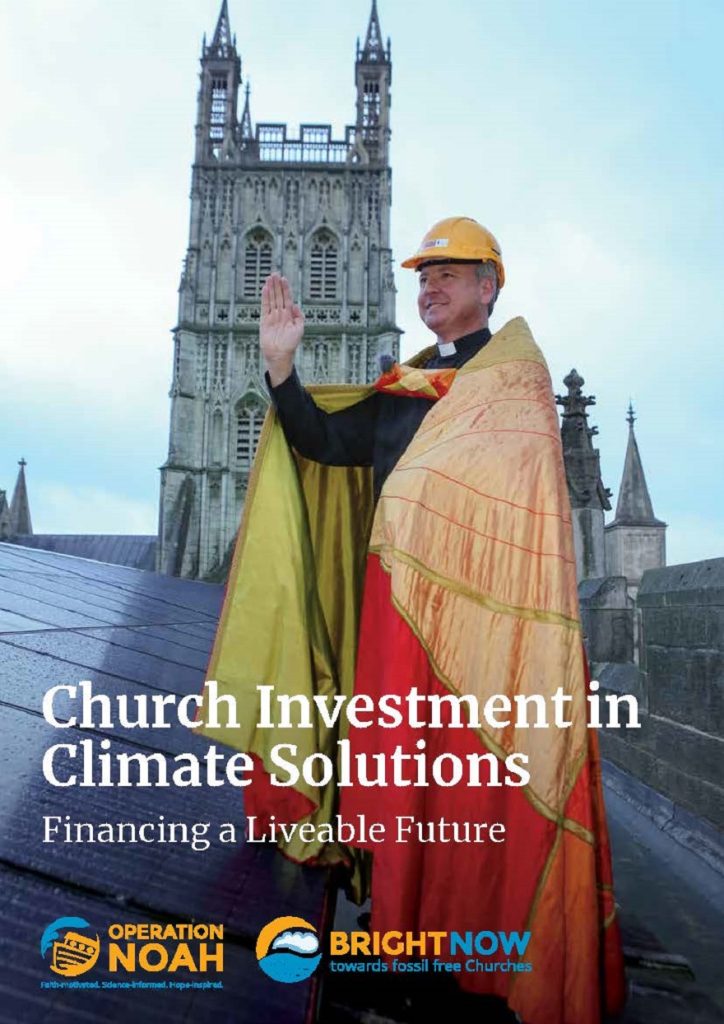Download the report

Our new Bright Now report, Church Investment in Climate Solutions: Financing a Liveable Future, calls on Churches to play a vital role in accelerating a fair and fast transition by investing in climate solutions.
The report presents how investment decisions that Churches and faith institutions make are a reflection of the Church, its beliefs and its values. Investing in climate solutions can be a significant way for Churches to stand in solidarity with the most marginalised communities and with the Earth.
The Church and the climate, conflict and cost of living crises
As well as the climate crisis, the world is now facing an energy and cost of living crisis, especially as a result of Russia’s illegal invasion of Ukraine. Given the need for greater energy security, investment in renewable energy and energy efficiency is needed at scale. If the world were to redirect the $570 billion of annual planned oil and gas investments towards renewables, this could fully finance wind and solar energy expansion in line with the 1.5°C target of the Paris Agreement.
Churches can play a crucial role by investing in climate solutions and by using their prophetic voice to call on governments to implement policy that addresses the climate crisis at the speed and scale required.
Climate science and the increasing urgency of action
The IPCC Sixth Assessment Report, published in the spring of 2022, highlighted that immediate and deep emissions reductions are needed across all sectors if we are to have any chance of limiting global heating to 1.5°C. It showed that transformation is needed in the systems that provide our energy, industry, transport, buildings, agriculture and land use.
While the scientific warnings are stark, including the risks of fast-approaching tipping points, every fraction of a degree matters and urgent action, with a rapid shift to clean energy and energy efficiency, could save the lives of millions of people.
Fossil fuel divestment and investment in a fair and fast transition
Most UK Churches have now completed divestment from fossil fuel companies. Increasing numbers of investment management companies offer ‘fossil free funds’, responding to demand from faith institutions and other clients. Yet the ethical investment process does not end with divestment. Churches and other faith institutions also need to consider the positive difference they wish to make in the world with their investments.
As they have in the fossil fuel divestment movement, Churches can shift markets and change public attitudes during this crucial decade when the world must cut global greenhouse emissions nearly in half. The report identifies examples of faith institutions leading the way on investment in climate solutions, including the Quakers in Britain, the Church of Ireland, the Diocese of Truro and the Church Commissioners (Church of England).
Climate solutions and the opportunities for investment
The report identifies various opportunities for investment in climate solutions, including:
- Renewable energy, which is cheaper than fossil fuels, can be deployed more quickly and can close the energy access gap for 770 million people currently without electricity
- Energy storage, a key technology for accelerating the decarbonisation of the electricity grid and which is forecast to grow by 15% as a result of policy developments in the US and EU
- Buildings and energy efficiency, from greener materials to the retrofitting of buildings
- Public transport and electric vehicles, investment that will be needed to reduce the 15% contribution that transport currently makes to overall greenhouse gas emissions
- Land use and sustainable forestry, which FIIND Impact Foundation identifies as the second most ‘investable’ sector that it analysed, after electricity production
- Clean cookstoves, an important solution in tackling global poverty and reducing greenhouse gas emissions, as 2.8 billion people still lack access to clean cooking fuels





